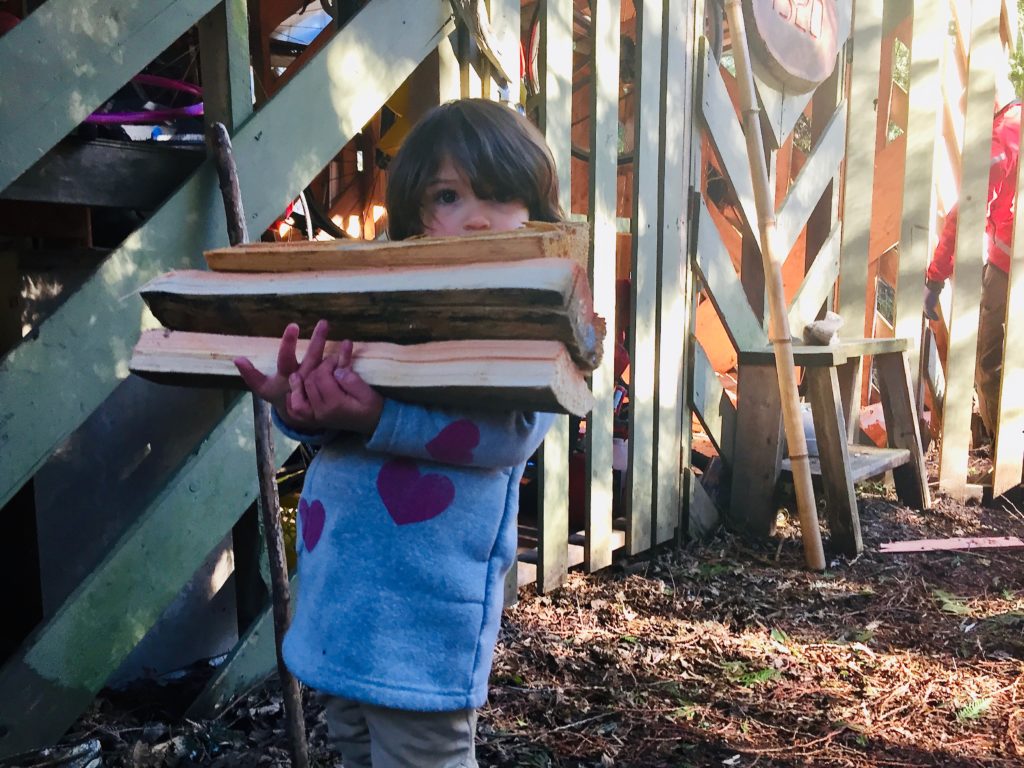
I’m not for a second complaining, but the truth is, we’re facing a bit of an emergency here: the woodshed, which we re-stocked just a few months ago, is almost bare.
Sure we have space heaters and even a few baseboards but, when the thermometer dips below zero and the Arctic Outflow is pulling trees out of the ground, whistling through every door and crack in our little old cabin, it’s the fire that keeps us warm.
Being so reliant on that wood pile has changed me.
I measure winter by it, calculating, constantly, how long it is likely to last and how many cold days lie ahead.
The need to chop kindling, or to re-pile wood closer to the fire forces me outside even when I’d rather huddle under a blanket. Inevitably I come back feeling more awake, more alive, and more ready for whatever else I’ve got to do that day.
Sometimes, when I head out to chop and haul, my kids will follow me and jump into the task at hand. You’d be surprised at how helpful a three year old can actually be….
Robin Wall Kimmerer calls the woodpile the great teacher.
Her book Braiding Sweetgrass is about deepening the human relationships to all that sustains us. If the relationship is healthy, we’ll all flourish. If not, we’ll all suffer, so the deepening is important.
When we understand that wood brings us heat, we’re more likely to appreciate the tree.
Feeling awash in gifts…
If we all felt this way, moment to moment with each item we consumed, I doubt we’d be making much garbage. We might even find that we needed less to sustain us.
Now imagine if we could get our heads out of this place where we see ourselves, our species, as a sort of plague or malicious element on the earth. How might that change things?
Until I read Braiding Sweetgrass, the idea of humans as a force of destruction was like a wall in my thinking. I love the human story, and want it to continue alongside all the other beautiful life on this planet… but it seemed like too much to ask. Maybe it still is but, it helps to recognize that my perspective on humanity is worldview not truth: these ideas were built into my brain starting back in the early days of language acquisition initial encounters with solid foods.
Moving beyond our shameful self-perception as consumers, as takers, says Robin Wall-Kimmerer, starts with gratitude. We say thank you plenty to one another, but we need to learn to say it to the birds, the ponds, the water, the trees… and then we need to get our hands dirty.
In a chapter called “A Mother’s Work,” Robin Wall-Kimmerer writes about her years-long project to “rehabilitate” a small pond to make it swimmable for her children. In the process of caring for the pond, Kimmerer becomes the reluctant executioner to countless tadpoles and plants. She questions her own narrow interests and the meaning of “good.” The work, as it turns out, is not about reaching the desired end, but about the relationship forged from the effort.
“The pond built my muscles, wove my baskets, mulched my garden, made my tea and trellised my morning glories. Our lives became entwined in ways both material and spiritual. It’s been a balanced exchange: I worked on the pond and the pond worked on me, and together, we made a good home.”
The gift was the work itself. Work, brings me back to the wood pile.
Tomorrow morning I will release myself from the warmth of my bed , slip on my snow boots and head outside. I’ll put the heavy splitting axe to work, and I will say thank you to the remaining wood. I will say thank you to the trees above me and to the winter wind.
I’ll source some more wood and use it less and less. Before long I’ll shift my thoughts to the buds on the apple trees and tiny plants poking their heads out of our kitchen garden. I’ll stick my hands in the soil in an act of pure gratitude.

Jackie
Rabia
Susie Hansen